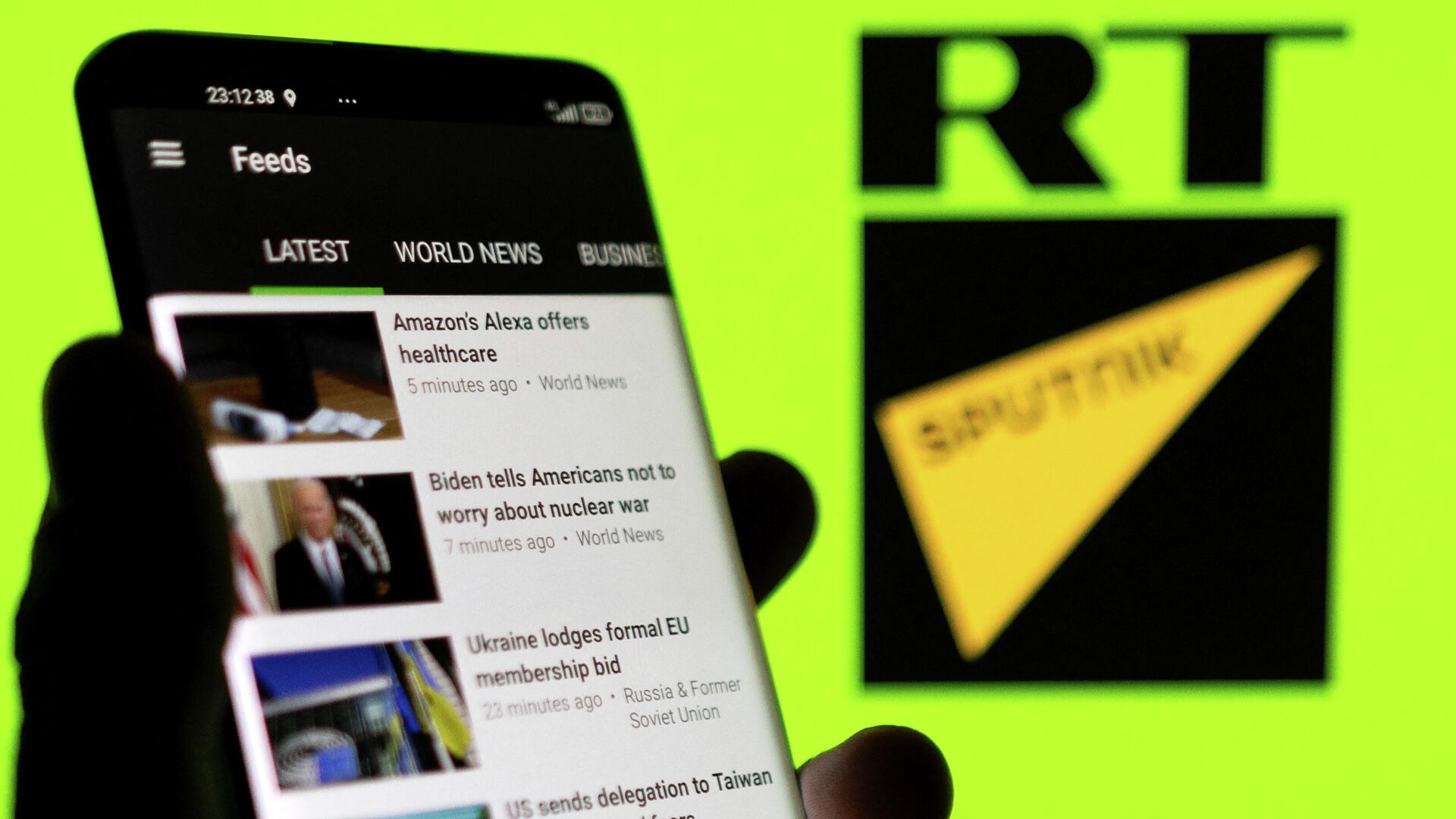https://sputnikglobe.com/20220314/as-it-giants-purge-russian-media-from-their-platforms-what-lessons-can-india-learn-from-campaign-1093859545.html
As IT Giants Purge Russian Media From Their Platforms, What Lessons Can India Learn From Campaign?
As IT Giants Purge Russian Media From Their Platforms, What Lessons Can India Learn From Campaign?
Sputnik International
As western firms have announced restrictions on Russian media, strategic thinkers and IT experts in India have questioned the credibility of Silicon Valley... 14.03.2022, Sputnik International
2022-03-14T13:25+0000
2022-03-14T13:25+0000
2023-04-14T12:56+0000
russia's special operation in ukraine
russia
ukraine
violence
meta
google
censor
rt
sputnik
us
https://cdn1.img.sputnikglobe.com/img/07e6/03/02/1093520413_0:187:3237:2008_1920x0_80_0_0_5179f12cf3112175b34df71f144efee7.jpg
"Censorship is normally associated with autocracies. But today, the social media platforms of Silicon Valley have become the new censors with extraterritorial powers," Brahma Chellaney, professor emeritus of strategic studies at India's Centre for Policy Research (CPR), says. "Google's YouTube, for example, has blocked access to RT from India, without the Indian government's approval," he adds.Days after special military operations began in Ukraine, the European Union suspended the broadcasting activities of Sputnik and RT/Russia Today (RT English, RT UK, RT Germany, RT France, and RT Spanish) throughout the bloc.US-based firms, which have cast themselves as politically neutral platforms, have not only followed the decision of the European Union but went ahead by suspending the operation in India."The EU is not at war with Russia, yet it doesn't want Europeans to hear or read Russian media perspectives. In contrast India has been involved in a Chinese border aggression which has lasted nearly two years without blocking China's state media. If anything, Indian media liberally quotes Chinese media reports," Chellaney said.Experts highlighted a series of events in the past few years when western social media platforms have refused to follow instructions given by the Indian government, primarily related to curbing of fake news which could incite violence in society.The Indian government threatened them with severe action after Twitter and Facebook invoked "freedom of expression" and democratic rights for not responding positively to censoring Twitter handles and websites spreading misinformation.Despite several requests, these platforms continue to avoid full compliance with the Indian government's demands.Contrary to its behaviour several times in the past, Google's Youtube has restricted the telecast of RT in India without any request for so doing by the Indian government.Jain notes the Ukraine conflict has clearly shown that the social media and news platforms held by private companies can be weaponised in times of war by the countries they are headquartered in."India must reduce critical foreign dependencies in the telecom and IT sectors for India's critical security," Jain concludes.India is the largest market for US-based social media companies such as Google, Twitter, Meta, and others.
ukraine
Sputnik International
feedback@sputniknews.com
+74956456601
MIA „Rosiya Segodnya“
2022
Rishikesh Kumar
https://cdn1.img.sputnikglobe.com/img/07e4/08/04/1080055820_0:0:388:389_100x100_80_0_0_40018ee210946d65d49ffba4f4c008e1.jpg
Rishikesh Kumar
https://cdn1.img.sputnikglobe.com/img/07e4/08/04/1080055820_0:0:388:389_100x100_80_0_0_40018ee210946d65d49ffba4f4c008e1.jpg
News
en_EN
Sputnik International
feedback@sputniknews.com
+74956456601
MIA „Rosiya Segodnya“
Sputnik International
feedback@sputniknews.com
+74956456601
MIA „Rosiya Segodnya“
Rishikesh Kumar
https://cdn1.img.sputnikglobe.com/img/07e4/08/04/1080055820_0:0:388:389_100x100_80_0_0_40018ee210946d65d49ffba4f4c008e1.jpg
ukraine, violence, meta, google, censor, rt, sputnik, us, social media, european union (eu), twitter
ukraine, violence, meta, google, censor, rt, sputnik, us, social media, european union (eu), twitter
As IT Giants Purge Russian Media From Their Platforms, What Lessons Can India Learn From Campaign?
13:25 GMT 14.03.2022 (Updated: 12:56 GMT 14.04.2023) As western firms have announced restrictions on Russian media, strategic thinkers and IT experts in India have questioned the credibility of Silicon Valley firms which often champion freedom of expression and democratic rights.
"Censorship is normally associated with autocracies. But today, the social media platforms of Silicon Valley have become the new censors with extraterritorial powers," Brahma Chellaney, professor emeritus of strategic studies at India's Centre for Policy Research (CPR), says. "Google's YouTube, for example, has blocked access to RT from India, without the Indian government's approval," he adds.
Days after special military operations began in Ukraine, the European Union suspended the broadcasting activities of Sputnik and RT/Russia Today (RT English, RT UK, RT Germany, RT France, and RT Spanish) throughout the bloc.
US-based firms, which have cast themselves as
politically neutral platforms, have not only followed the decision of the European Union but went ahead by suspending the operation in India.
"The EU is not at war with Russia, yet it doesn't want Europeans to hear or read Russian media perspectives. In contrast India has been involved in a Chinese border aggression which has lasted nearly two years without blocking China's state media. If anything, Indian media liberally quotes Chinese media reports," Chellaney said.
Experts highlighted a series of events in the past few years when western social media platforms have refused to follow instructions given by the Indian government, primarily related to curbing of fake news which could incite violence in society.
The Indian government threatened them with severe action after Twitter and Facebook invoked "freedom of expression" and democratic rights for not responding positively to censoring Twitter handles and websites spreading misinformation.
Despite several requests, these platforms continue to avoid full compliance with the Indian government's demands.
Contrary to its behaviour several times in the past, Google's Youtube has restricted the telecast of RT in India without any request for so doing by the Indian government.
"I believe any restrictions or censorship by any social media platforms or news websites in India should be imposed only if legally desired by India's sovereign government or Indian judicial courts," Jiten Jain, director of digital lab Voyager Infosec, thinks.
Jain notes the Ukraine conflict has clearly shown that the social media and news platforms held by private companies can be weaponised in times of war by the countries they are headquartered in.
"India must reduce critical foreign dependencies in the telecom and IT sectors for India's critical security," Jain concludes.
India is the largest market for US-based social media companies such as Google, Twitter, Meta, and others.





